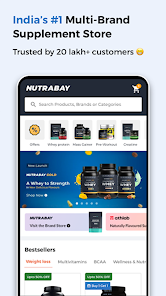Maintaining a healthy lifestyle has become more convenient than ever with the advent of nutrition apps. These apps are designed to support individuals in managing their dietary habits, tracking essential nutrients, and achieving health goals. Whether you’re focusing on sports nutrition or looking for effective protein apps, the right nutrition app can be a game-changer in your wellness journey. In this article, we will explore some of the best features of nutrition apps and how they can help you make informed dietary choices.

What Are Nutrition Apps?
Nutrition apps are digital tools that help users monitor and improve their eating habits. They offer a variety of features, including calorie counting, nutrient analysis, meal planning, and fitness tracking. With the rise of health awareness, these apps have become indispensable for anyone aiming to lead a healthier life.
Benefits of Using Nutrition Apps
- Personalized Recommendations Most nutrition apps provide tailored diet plans based on your age, weight, activity level, and health goals.
- Nutrient Tracking Apps focusing on sports nutrition and protein tracking allow users to monitor their intake of essential nutrients like carbohydrates, fats, and proteins.
- Goal Setting and Progress Monitoring Whether your goal is weight loss, muscle gain, or maintaining overall health, nutrition apps provide tools to track your progress.
- Convenience With these apps, you can plan your meals, log your food intake, and even scan barcodes for nutritional information—all in one place.
- Educational Insights Many apps include educational resources to help users understand the importance of balanced nutrition and the role of specific nutrients in the body.
Key Features to Look for in Nutrition Apps
- Comprehensive Nutrient Database Choose an app that offers a wide variety of foods and their nutritional information, especially if you’re focused on sports nutrition.
- Protein Tracking Protein apps are particularly useful for individuals looking to build muscle or maintain an active lifestyle. Look for apps that provide detailed insights into your protein intake.
- Integration with Fitness Trackers Apps that sync with fitness trackers can provide a more holistic view of your health by combining dietary and physical activity data.
- Customizable Meal Plans A good nutrition app should allow you to customize meal plans according to your dietary preferences and goals.
- User-Friendly Interface Ensure the app is easy to navigate and includes features like voice logging or quick food searches.
Sports Nutrition: A Key Focus Area
For athletes and fitness enthusiasts, sports nutrition is a critical aspect of performance and recovery. Nutrition apps tailored for sports nutrition offer features like macronutrient tracking, hydration monitoring, and post-workout meal suggestions. By focusing on nutrient timing and the right balance of carbohydrates, proteins, and fats, these apps can help optimize athletic performance.
Protein Apps: Meeting Your Protein Goals
Protein is a vital nutrient for muscle repair, growth, and overall health. Protein apps are specifically designed to help users meet their daily protein requirements. These apps often include features like:
- Protein-rich recipe suggestions.
- Alerts to remind you to meet your protein goals.
- A breakdown of protein sources, including plant-based options for vegetarians and vegans.
How to Choose the Right Nutrition App
Selecting the right nutrition app depends on your individual needs and lifestyle. Here are some factors to consider:
- Health Goals Determine whether your primary focus is weight management, muscle building, or maintaining a balanced diet.
- App Compatibility Ensure the app is compatible with your smartphone and any wearable devices you use.
- Cost While many apps are free, some offer premium features at an additional cost. Evaluate whether the paid features align with your goals.
- Reviews and Ratings Check user reviews and ratings to gauge the app’s reliability and effectiveness.
- Nutritional Expertise Opt for apps developed or endorsed by nutrition experts to ensure the accuracy of the information provided.
The Role of Nutrition Apps in Wellness
Nutrition apps not only make healthy eating easier but also empower users to take control of their health. By providing actionable insights into dietary habits, these apps encourage sustainable lifestyle changes. For those focused on sports nutrition, they serve as a valuable resource for optimizing performance and recovery. Similarly, protein apps ensure users meet their specific protein intake requirements, aiding in muscle development and overall well-being.
Challenges of Using Nutrition Apps
While nutrition apps offer numerous benefits, there are some challenges to be aware of:
- Data Accuracy The accuracy of nutritional data can vary between apps, so it’s important to cross-check information.
- Over-Reliance Users may become overly dependent on apps, which can lead to stress if they miss logging meals or meeting targets.
- Privacy Concerns Some apps require personal data, so ensure you read the privacy policy before signing up.
- Time-Consuming Logging every meal can be time-consuming, especially for those with busy schedules.
Conclusion
Nutrition apps and protein apps have revolutionized the way we approach health and wellness. By focusing on areas like sports nutrition and protein tracking, these apps cater to a wide range of needs and lifestyles. Whether you’re an athlete aiming for peak performance or someone looking to improve overall health, the right nutrition or protein app can make a significant difference. Start your journey towards a healthier lifestyle today by exploring the options available and choosing the app that best aligns with your goals. With tools to track your dietary habits and provide valuable insights, these apps truly put health and wellness in your hands.